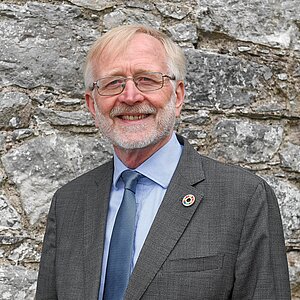Dr. Séamus Ó Tuama

Prof. Séamus Ó Tuama is Director of Adult Continuing Education and an academic in the School of Government & Politics at University College Cork, Ireland. He is also an Adjunct Professor at the University of Science & Technology Meghalaya, India.
He is Chair of the ASEM Lifelong Learning Hub, which aims to shape the direction of lifelong learning research, policy and practice of the ASEM community. ASEM (Asia-Europe Meeting) is an intergovernmental process established in 1996 to foster dialogue and cooperation between Asia and Europe. ASEM comprises 53 partners: 30 European and 21 Asian countries, the European Union, and the ASEAN Secretariat.
He sits on the Advisory Group for Universities’ Contributions to lifelong learning led by UNESCO Institute for Lifelong Learning and Shanghai Open University. He a member of the Singapore Workforce Development Applied Research Fund Expert Review Panel, the Editorial Board of Journal of Continuing Higher Education, Cork UNESCO learning city steering group, the Board of the Higher Education Research Centre, Dublin City University, the George Moore Scholars (Ireland Funds) panel and is an External Examiner at Trinity College Dublin. He is a member of the International Adult and Continuing Education Hall of Fame. He evaluates research for the European Commission and national agencies. He publishes, lectures, leads workshop and gives keynotes across the globe.
His poetry formed the lyrical basis for the composition A Human Race–Nine Vocal Sagas, composed by Tamar Putkaradze, first performed at Tbilisi Vano Sarajishvili State Conservatoire. He writes a weekly column for the Irish Examiner newspaper.
- Lifelong Learning
- learner-centric education
- adult and continuing education
- higher education
- learning cities
- community learning and outreach
- reflexivity in learning.
- Ó TUAMA, S. (2022). Taking Forward Perspectives on Reflexivity in Learning: Five Capitals. In: Evans, K., Lee, W.O., Markowitsch, J., Zukas, M. (eds) Third International Handbook of Lifelong Learning. Springer International Handbooks of Education. Springer, Cham. https://doi.org/10.1007/978-3-030-67930-9_13-1
- Ó TUAMA, S. (2020) Learning Neighbourhoods: Lifelong learning, Community and Sustainability in Cork Learning City. Andragoška spoznanja/Studies in Adult Education and Learning, 2020, 26(1), 53-65. DOI: http://dx.doi.org/10.4312/as.26.1.53-65
- Ó TUAMA, S. (2019). Community-Engaged Universities: Approaches and Context. Adult Learning, 30(3), 95-98. doi:10.1177/1045159519853804
- JOHNSON, M., DANVERS, E., HINTON-SMITH, T., ATKINSON, K., BOWDEN, G., FOSTER, J., .Ó TUAMA, S. . . Williams, S. (2019). Higher Education Outreach: Examining Key Challenges for Academics. British Journal of Educational Studies, 67(4), 469-491. doi:10.1080/00071005.2019.1572101
CG 2: Transitions from Sectors of Adult Education to Systems of Lifelong Learning
Co-Moderators: Dr. Paed. Søren Ehlers, Dr. Shalini Singh
Despite the commitment of most countries to provide lifelong learning opportunities to everyone as part of the Sustainable Development Goal 4 and UNESCO’s call for declaring lifelong learning a right for everyone, lifelong learning remains far from becoming a reality in most parts of the world. Its realisation requires an integration of education sectors (from early childhood to adults), education settings (formal, non-formal and informal), and policy areas beyond education to place the individual learner at the centre of everything with capabilities and conditions to learn throughout life. In most lifelong learning policies and initiatives, this idea is not reflected, especially when they are restricted to outcomes like enhancing the employability and productivity of the working age population. Still, most countries claim to be moving towards achieving Lifelong Learning for All in the long run and have been inducing policy change in favour of their own interpretations about lifelong learning.
Focusing on adults as the target group, this group work aims to develop participants’ understanding of
1) the differences between policies and concepts of adult education, adult learning, and lifelong learning;
2) prospects and challenges associated with the policy change from adult education to adult learning and lifelong learning;
3) consequences of such changes or avoidance of changes in policies for adult learners. Methodologically, participants will develop an understanding of the difference between policy terms, scientific concepts, professional ideas and practices regarding adult education, adult learning and lifelong learning and use them comparatively for analysing policies.


